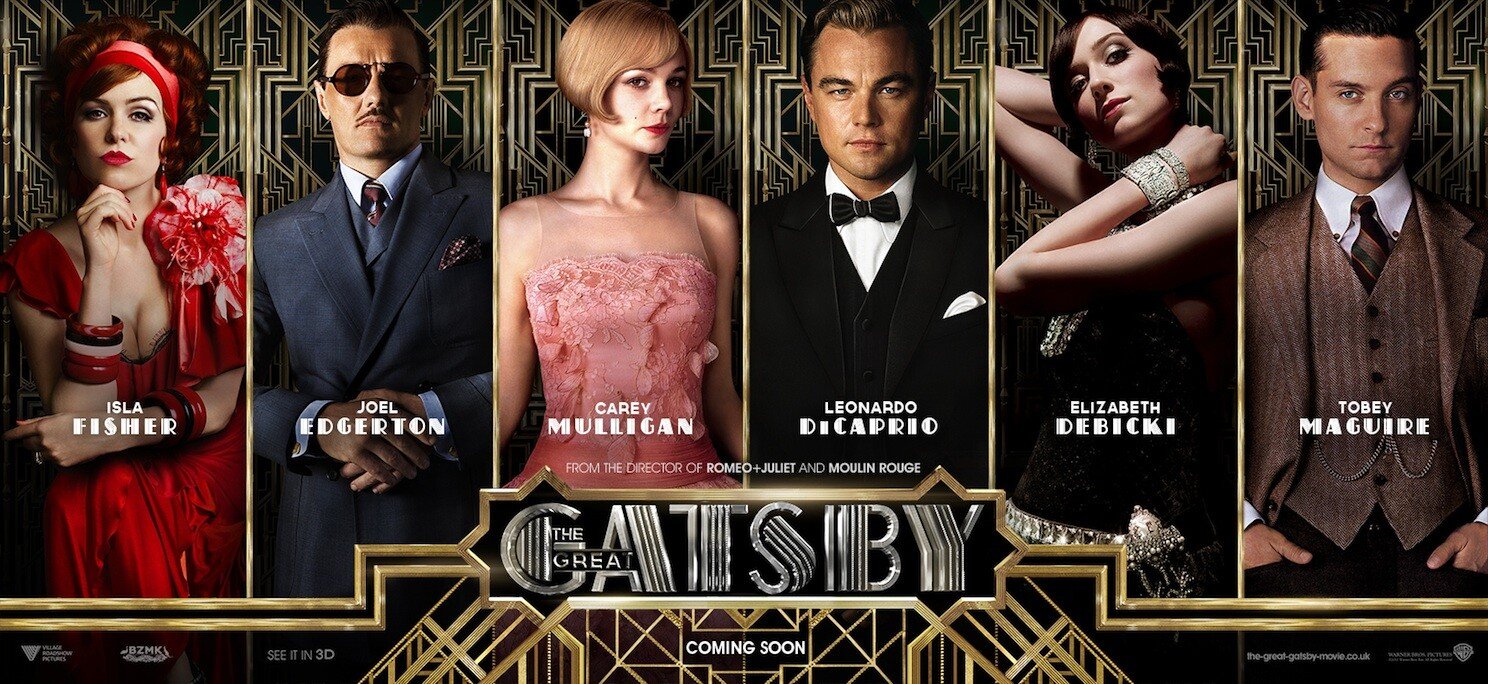God's Truth: The Great Gatsby Trailer #2
New York, 1922. Focus on the corner of a replica 1929 Duesenberg Model J. Leonardo DiCaprio, playing Jay Gatsby, exits the yellow luxury car. “I will tell you God’s truth,” he says as the camera cuts to him weaving recklessly through traffic. Kanye West’s “No Church in the Wild” begins to play. “God’s truth about myself,” continues Gatsby to a worried Tobey Maguire, playing Nick Carraway. Nearly everything Gatsby says after this is a lie.
F. Scott Fitzgerald’s 1925 novel, The Great Gatsby, is one of the best American books. It is, as Fitzgerald hoped, “extraordinary and beautiful and simple and intricately patterned.” The previews for Baz Luhrman’s 2013 eponymous film adaptation are some of the best American trailers. They’re frantic, ambitious, restless, and riveting. That The Great Gatsbyis, itself, a mediocre film is neither here nor there. Previews are often judged in the light of the films they advertise, but nothing stops them from being separately appraised, and when the gap in quality is as vast as it is with The Great Gatsby, the trailers demand to be appreciated in isolation.
“The Great Gatsby Official Trailer #2” is a moving portrait of America. Gatsby is not telling a story of his life that Carraway is likely to see as true, but he is telling God’s truth about himself, not the truth of his literal past, but the truth of his self-invention.
The trailer is unashamedly excessive. “Gatsby, he had an extraordinary sense of hope,” Carraway intones as a green light unsubtly flashes. “It all makes sense,” says a disembodied voice as a hand glides over a dimly lit letter. In quick cuts to Gatsby’s parties, there is not only wild dancing but also raining confetti. When Gatsby wordlessly raises a drink, he is framed by fireworks. A mansion and manicured garden is not enough; a man must also swing a polo mallet on horseback. “Gatsby” is said five times in the first sixty-five seconds.
The trailer truly succeeds through juxtaposition. The dark silhouettes of men with pickaxes and shovels in front of a horizon of smog pushes up against Gatsby standing in front of an extravagant party. Gatsby fleetingly reaches out towards a barely perceptible green light immediately before insisting he can repeat the past. A sign advertising the Ziegfeld Follies dominates the frame as Filter angrily covers The Turtles’ 1967 song, “So Happy Together,” devolving into screams as a gloved hand violently stabs a block of ice.
This is all, of course, ridiculous. It is the self-consciously performative excess of a man who believes money, confidence, and ambition can buy success. The futility of his dreams is known to the viewer, but it’s never actually acknowledged. Carraway warns he had the uneasy feeling Gatsby was guarding secrets, but the trailer rarely cuts away from the sheen of shiny things. A man in a blue suit gets punched in the face in front of a closing gate. A man holds a gun in silhouette. A woman with red hair is struck by a yellow car. Gatsby screams and smashes stuff. This is all very ominous, but also completely void of context.
Fitting as many of the book’s symbols, plots, and lines as possible into fewer than two and half a minutes, the content is completely abstracted. “You can’t repeat the past,” Carraway insists. “Can’t repeat the past?” Gatsby asks incredulously. “Why of course you can!” What past? What Gatsby?
The symbolism in the novel is intentionally obvious. The book is a satire, a metafiction, and a tragedy. The green light is a parody of literary devices. The movie adaptation’s cardinal sin is that it takes the action of the book too seriously. The book is not sad because Gatsby can’t make Daisy Buchanan marry him. Their relationship is too superficial, too selfish, too entirely insane to be invested in. Carraway’s narration is too unaware. The tragedy is that Gatsby can’t reinvent himself; that lies, that fiction, can’t rewrite American society; that the Buchanans’ carelessness is unaccountable; and that beneath the gleam of easy spending and frivolity, the nouveaux riches of West Egg are wholly apart from the old money of East Egg. The past is never past. The whole culture is crooked and, the modern reader knows, about to collapse.
The emptiness of the symbolism in the trailer is even more marked. Who is Gatsby apart from the lies he tells about himself and the whispered rumors that surround him? Gatsby’s hope, invested in the green light, is introduced fewer than two minutes before he fails to grasp it.
The trailer has an impressionistic quality. Knowledge of the book is needed to understand anything that’s going on. But an unmistakable feeling is evoked, one of performed bravado, boastful wealth, mysterious fame, impending chaos, self-destructive hope, desperate denial, and nostalgic resignation.
“What’s a king to a God?” West asks in his song. “What’s a God to a non-believer?” Gatsby’s fiction is collaborative; he needs co-conspirators. Faced with the indifference of bottomless cruelty, he is beat back into the past.
